Organizational Behaviour Analysis: Marks & Spencer Report and Findings
VerifiedAdded on 2021/02/22
|15
|4390
|43
Report
AI Summary
This report provides an in-depth analysis of organizational behaviour within Marks & Spencer (M&S), a multinational retailer. It explores the influence of organizational culture, power dynamics, and political behaviours on individual and team performance. The report utilizes Handy's typology to examine different cultural dimensions within M&S, including power, role, task, and person cultures, as well as Hofstede's cultural dimensions. It also examines different types of organizational power such as legitimate, coercive, reward, expert, and referent power, and how these impact employee motivation and performance. Furthermore, the report discusses the impact of organizational politics. It then delves into content and process theories of motivation, including Maslow's hierarchy of needs, to assess how these theories can be applied to improve employee motivation and overall organizational performance. The report concludes by providing recommendations for M&S to enhance its organizational behaviour practices.
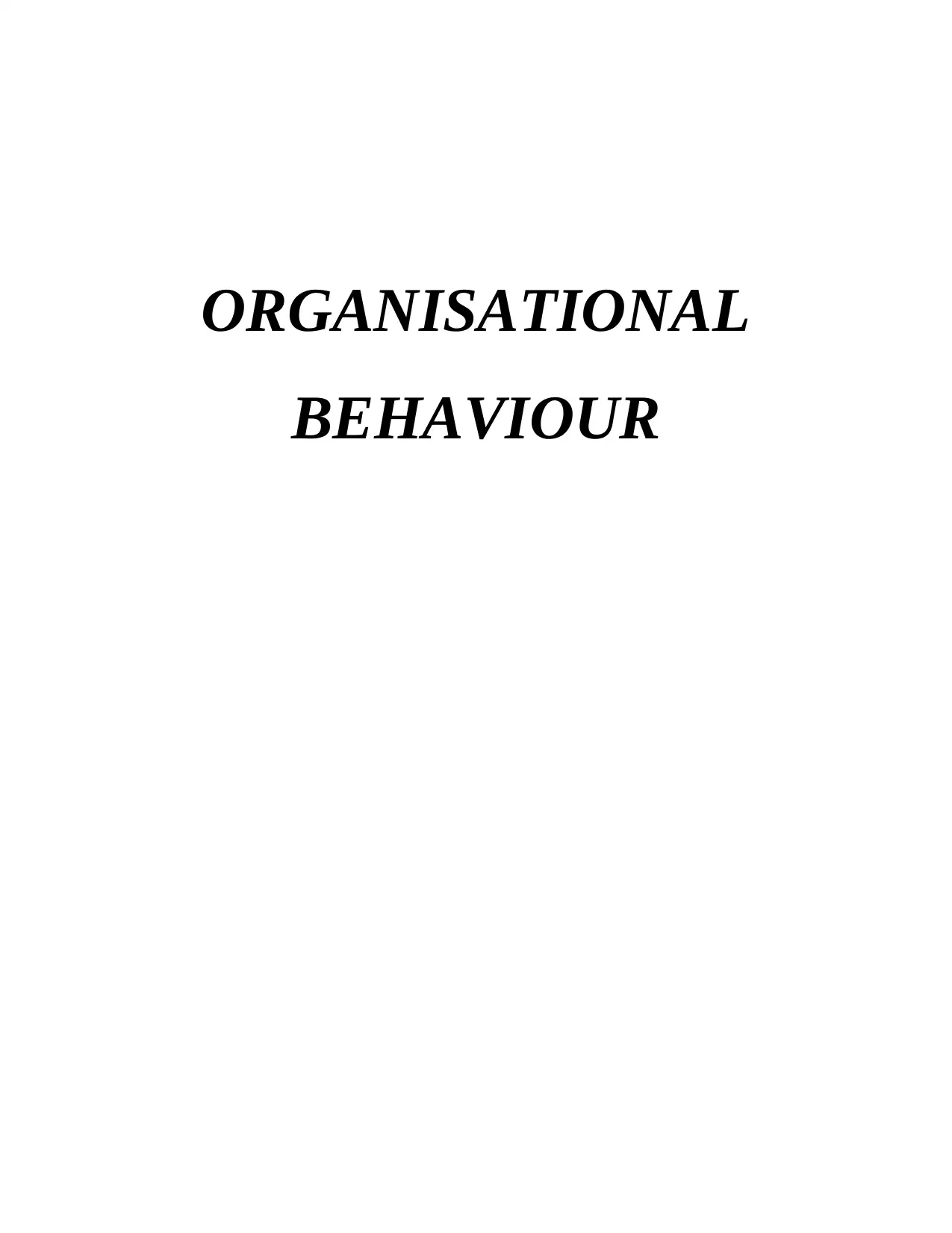
ORGANISATIONAL
BEHAVIOUR
BEHAVIOUR
Paraphrase This Document
Need a fresh take? Get an instant paraphrase of this document with our AI Paraphraser
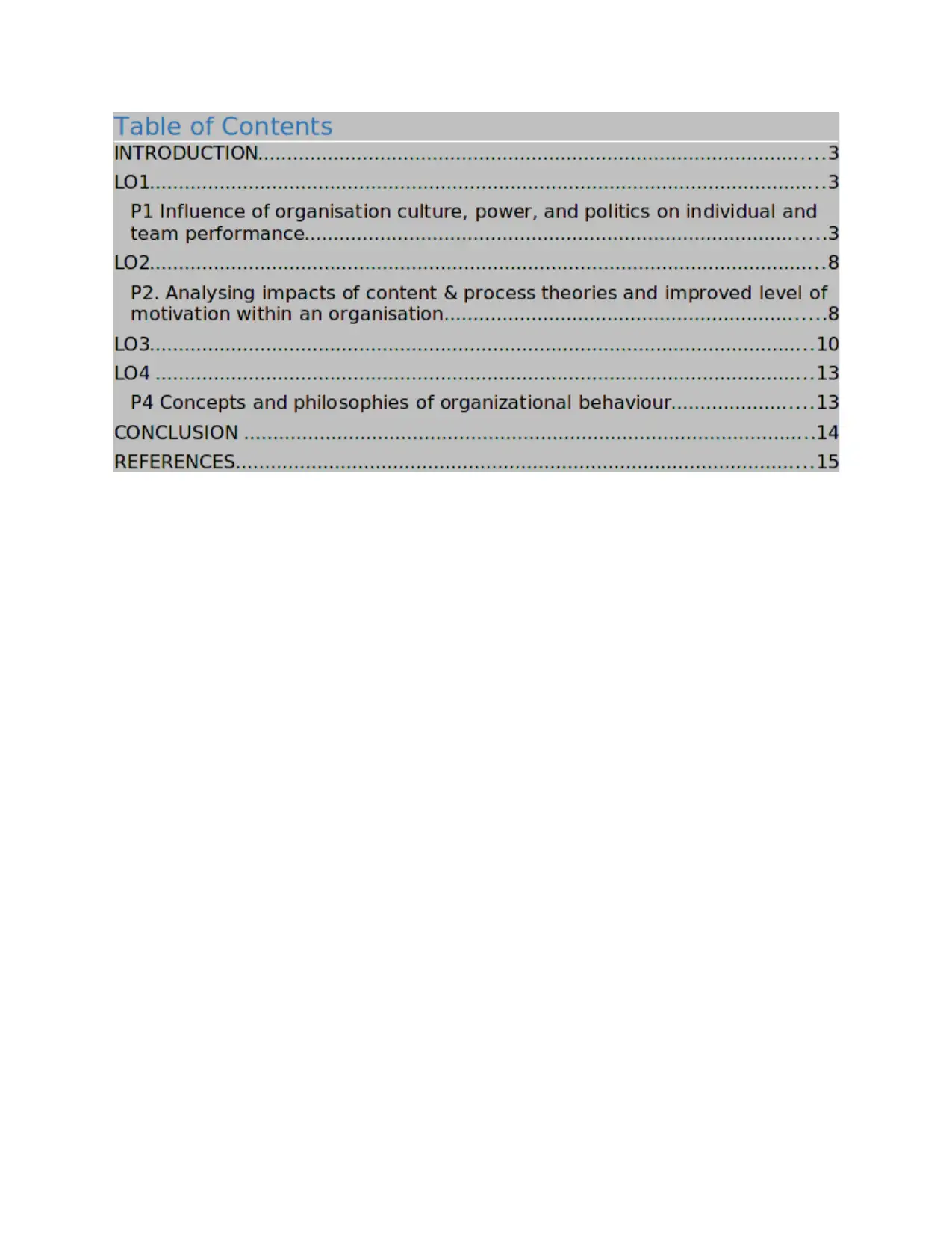
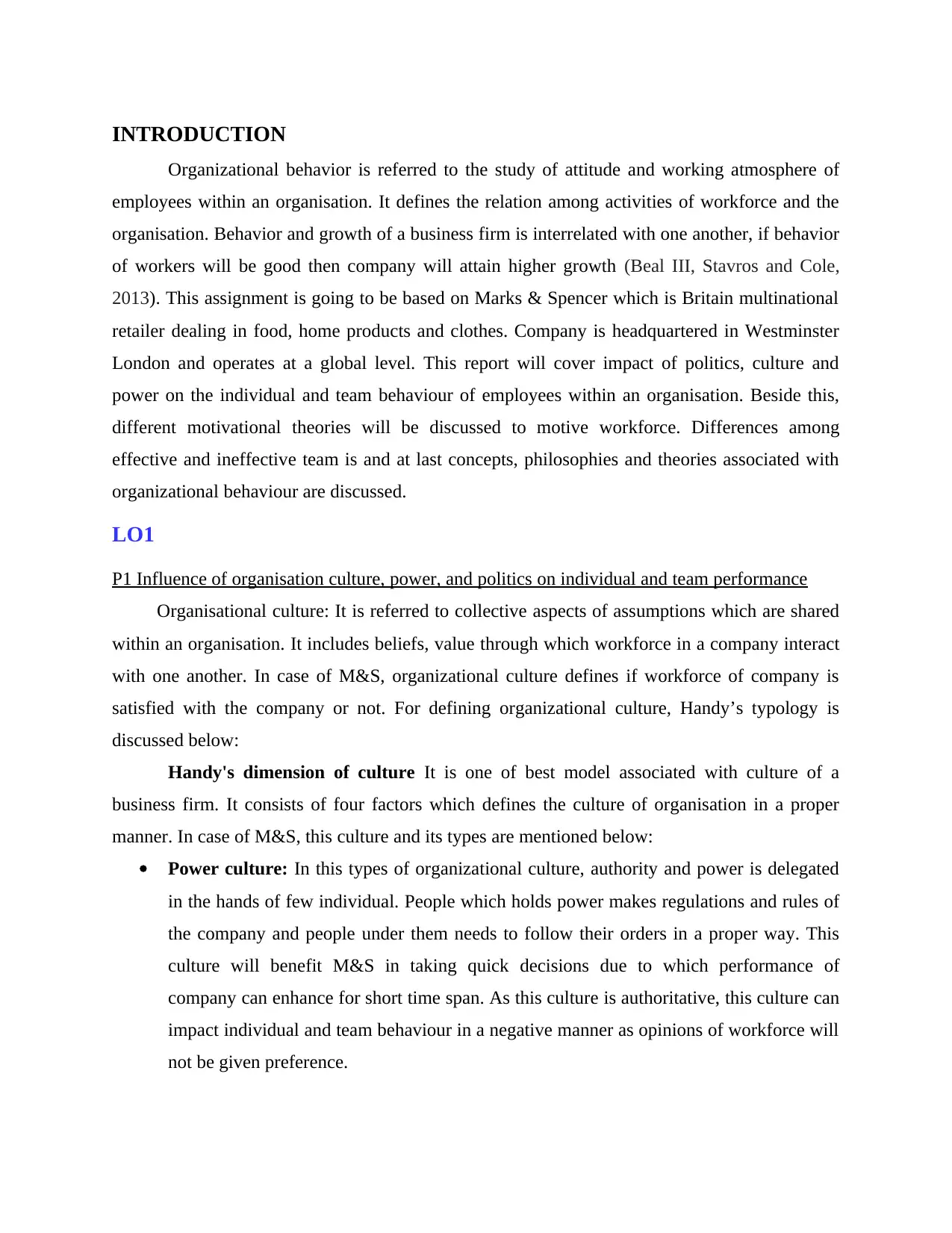
INTRODUCTION
Organizational behavior is referred to the study of attitude and working atmosphere of
employees within an organisation. It defines the relation among activities of workforce and the
organisation. Behavior and growth of a business firm is interrelated with one another, if behavior
of workers will be good then company will attain higher growth (Beal III, Stavros and Cole,
2013). This assignment is going to be based on Marks & Spencer which is Britain multinational
retailer dealing in food, home products and clothes. Company is headquartered in Westminster
London and operates at a global level. This report will cover impact of politics, culture and
power on the individual and team behaviour of employees within an organisation. Beside this,
different motivational theories will be discussed to motive workforce. Differences among
effective and ineffective team is and at last concepts, philosophies and theories associated with
organizational behaviour are discussed.
LO1
P1 Influence of organisation culture, power, and politics on individual and team performance
Organisational culture: It is referred to collective aspects of assumptions which are shared
within an organisation. It includes beliefs, value through which workforce in a company interact
with one another. In case of M&S, organizational culture defines if workforce of company is
satisfied with the company or not. For defining organizational culture, Handy’s typology is
discussed below:
Handy's dimension of culture It is one of best model associated with culture of a
business firm. It consists of four factors which defines the culture of organisation in a proper
manner. In case of M&S, this culture and its types are mentioned below:
Power culture: In this types of organizational culture, authority and power is delegated
in the hands of few individual. People which holds power makes regulations and rules of
the company and people under them needs to follow their orders in a proper way. This
culture will benefit M&S in taking quick decisions due to which performance of
company can enhance for short time span. As this culture is authoritative, this culture can
impact individual and team behaviour in a negative manner as opinions of workforce will
not be given preference.
Organizational behavior is referred to the study of attitude and working atmosphere of
employees within an organisation. It defines the relation among activities of workforce and the
organisation. Behavior and growth of a business firm is interrelated with one another, if behavior
of workers will be good then company will attain higher growth (Beal III, Stavros and Cole,
2013). This assignment is going to be based on Marks & Spencer which is Britain multinational
retailer dealing in food, home products and clothes. Company is headquartered in Westminster
London and operates at a global level. This report will cover impact of politics, culture and
power on the individual and team behaviour of employees within an organisation. Beside this,
different motivational theories will be discussed to motive workforce. Differences among
effective and ineffective team is and at last concepts, philosophies and theories associated with
organizational behaviour are discussed.
LO1
P1 Influence of organisation culture, power, and politics on individual and team performance
Organisational culture: It is referred to collective aspects of assumptions which are shared
within an organisation. It includes beliefs, value through which workforce in a company interact
with one another. In case of M&S, organizational culture defines if workforce of company is
satisfied with the company or not. For defining organizational culture, Handy’s typology is
discussed below:
Handy's dimension of culture It is one of best model associated with culture of a
business firm. It consists of four factors which defines the culture of organisation in a proper
manner. In case of M&S, this culture and its types are mentioned below:
Power culture: In this types of organizational culture, authority and power is delegated
in the hands of few individual. People which holds power makes regulations and rules of
the company and people under them needs to follow their orders in a proper way. This
culture will benefit M&S in taking quick decisions due to which performance of
company can enhance for short time span. As this culture is authoritative, this culture can
impact individual and team behaviour in a negative manner as opinions of workforce will
not be given preference.
⊘ This is a preview!⊘
Do you want full access?
Subscribe today to unlock all pages.

Trusted by 1+ million students worldwide
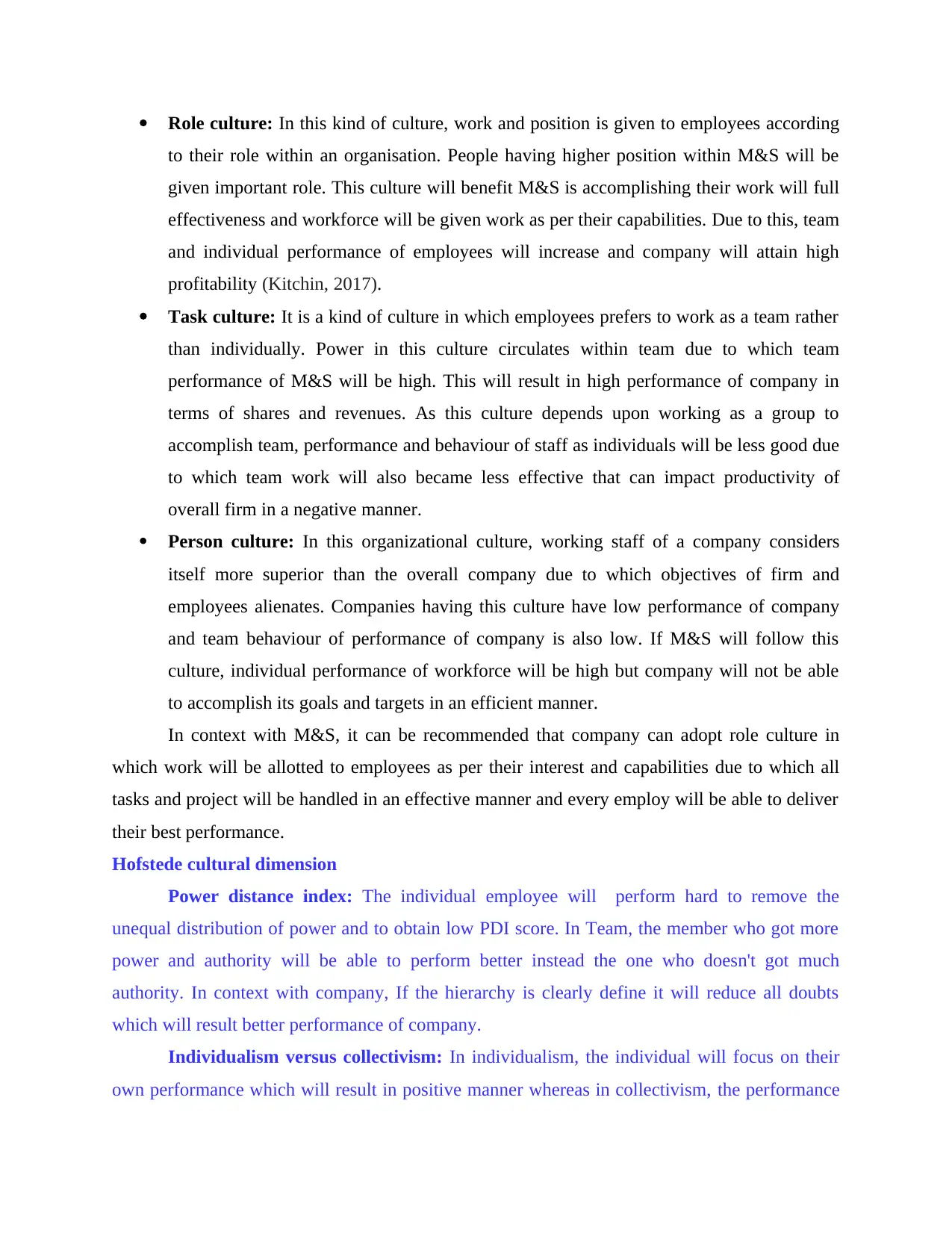
Role culture: In this kind of culture, work and position is given to employees according
to their role within an organisation. People having higher position within M&S will be
given important role. This culture will benefit M&S is accomplishing their work will full
effectiveness and workforce will be given work as per their capabilities. Due to this, team
and individual performance of employees will increase and company will attain high
profitability (Kitchin, 2017).
Task culture: It is a kind of culture in which employees prefers to work as a team rather
than individually. Power in this culture circulates within team due to which team
performance of M&S will be high. This will result in high performance of company in
terms of shares and revenues. As this culture depends upon working as a group to
accomplish team, performance and behaviour of staff as individuals will be less good due
to which team work will also became less effective that can impact productivity of
overall firm in a negative manner.
Person culture: In this organizational culture, working staff of a company considers
itself more superior than the overall company due to which objectives of firm and
employees alienates. Companies having this culture have low performance of company
and team behaviour of performance of company is also low. If M&S will follow this
culture, individual performance of workforce will be high but company will not be able
to accomplish its goals and targets in an efficient manner.
In context with M&S, it can be recommended that company can adopt role culture in
which work will be allotted to employees as per their interest and capabilities due to which all
tasks and project will be handled in an effective manner and every employ will be able to deliver
their best performance.
Hofstede cultural dimension
Power distance index: The individual employee will perform hard to remove the
unequal distribution of power and to obtain low PDI score. In Team, the member who got more
power and authority will be able to perform better instead the one who doesn't got much
authority. In context with company, If the hierarchy is clearly define it will reduce all doubts
which will result better performance of company.
Individualism versus collectivism: In individualism, the individual will focus on their
own performance which will result in positive manner whereas in collectivism, the performance
to their role within an organisation. People having higher position within M&S will be
given important role. This culture will benefit M&S is accomplishing their work will full
effectiveness and workforce will be given work as per their capabilities. Due to this, team
and individual performance of employees will increase and company will attain high
profitability (Kitchin, 2017).
Task culture: It is a kind of culture in which employees prefers to work as a team rather
than individually. Power in this culture circulates within team due to which team
performance of M&S will be high. This will result in high performance of company in
terms of shares and revenues. As this culture depends upon working as a group to
accomplish team, performance and behaviour of staff as individuals will be less good due
to which team work will also became less effective that can impact productivity of
overall firm in a negative manner.
Person culture: In this organizational culture, working staff of a company considers
itself more superior than the overall company due to which objectives of firm and
employees alienates. Companies having this culture have low performance of company
and team behaviour of performance of company is also low. If M&S will follow this
culture, individual performance of workforce will be high but company will not be able
to accomplish its goals and targets in an efficient manner.
In context with M&S, it can be recommended that company can adopt role culture in
which work will be allotted to employees as per their interest and capabilities due to which all
tasks and project will be handled in an effective manner and every employ will be able to deliver
their best performance.
Hofstede cultural dimension
Power distance index: The individual employee will perform hard to remove the
unequal distribution of power and to obtain low PDI score. In Team, the member who got more
power and authority will be able to perform better instead the one who doesn't got much
authority. In context with company, If the hierarchy is clearly define it will reduce all doubts
which will result better performance of company.
Individualism versus collectivism: In individualism, the individual will focus on their
own performance which will result in positive manner whereas in collectivism, the performance
Paraphrase This Document
Need a fresh take? Get an instant paraphrase of this document with our AI Paraphraser
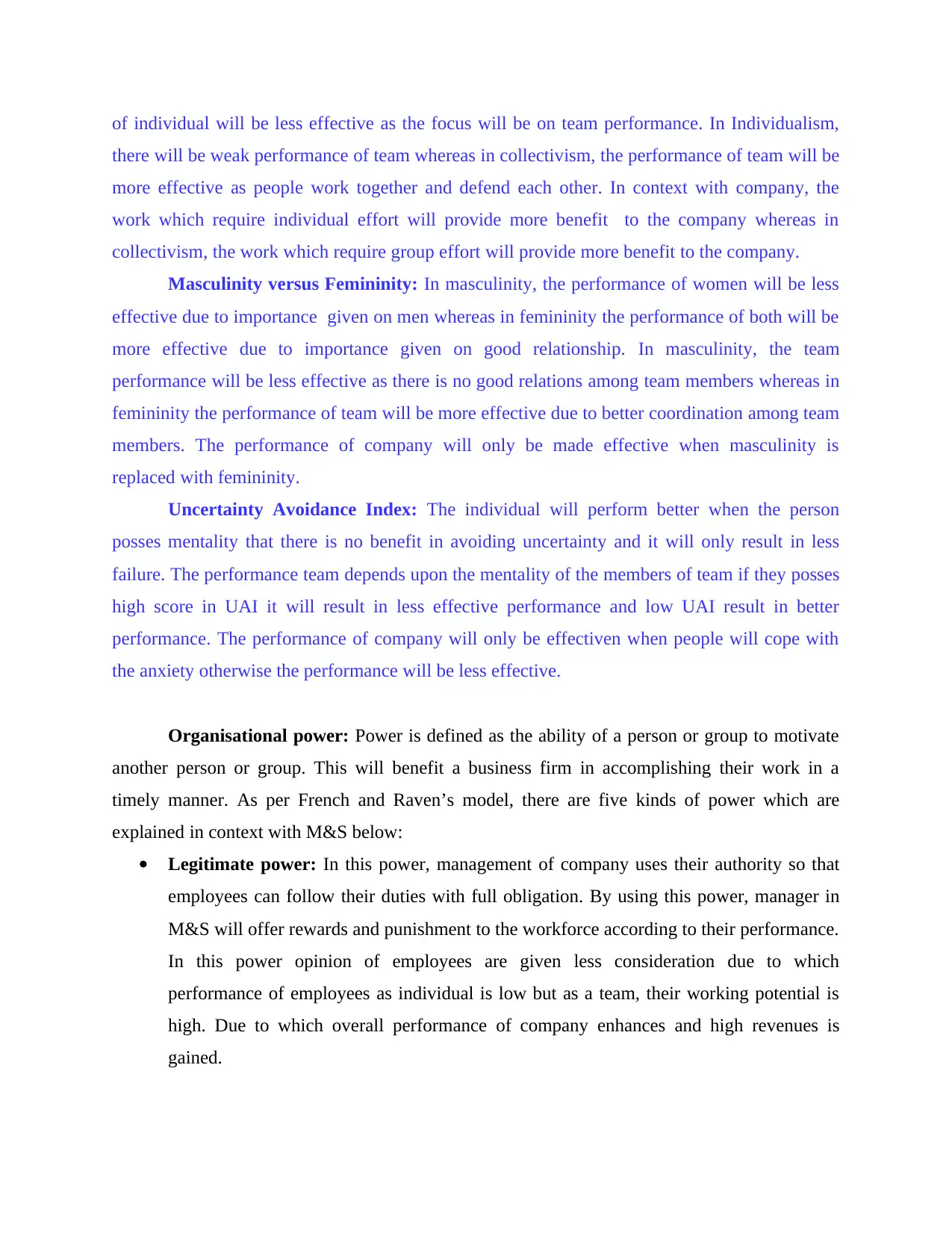
of individual will be less effective as the focus will be on team performance. In Individualism,
there will be weak performance of team whereas in collectivism, the performance of team will be
more effective as people work together and defend each other. In context with company, the
work which require individual effort will provide more benefit to the company whereas in
collectivism, the work which require group effort will provide more benefit to the company.
Masculinity versus Femininity: In masculinity, the performance of women will be less
effective due to importance given on men whereas in femininity the performance of both will be
more effective due to importance given on good relationship. In masculinity, the team
performance will be less effective as there is no good relations among team members whereas in
femininity the performance of team will be more effective due to better coordination among team
members. The performance of company will only be made effective when masculinity is
replaced with femininity.
Uncertainty Avoidance Index: The individual will perform better when the person
posses mentality that there is no benefit in avoiding uncertainty and it will only result in less
failure. The performance team depends upon the mentality of the members of team if they posses
high score in UAI it will result in less effective performance and low UAI result in better
performance. The performance of company will only be effectiven when people will cope with
the anxiety otherwise the performance will be less effective.
Organisational power: Power is defined as the ability of a person or group to motivate
another person or group. This will benefit a business firm in accomplishing their work in a
timely manner. As per French and Raven’s model, there are five kinds of power which are
explained in context with M&S below:
Legitimate power: In this power, management of company uses their authority so that
employees can follow their duties with full obligation. By using this power, manager in
M&S will offer rewards and punishment to the workforce according to their performance.
In this power opinion of employees are given less consideration due to which
performance of employees as individual is low but as a team, their working potential is
high. Due to which overall performance of company enhances and high revenues is
gained.
there will be weak performance of team whereas in collectivism, the performance of team will be
more effective as people work together and defend each other. In context with company, the
work which require individual effort will provide more benefit to the company whereas in
collectivism, the work which require group effort will provide more benefit to the company.
Masculinity versus Femininity: In masculinity, the performance of women will be less
effective due to importance given on men whereas in femininity the performance of both will be
more effective due to importance given on good relationship. In masculinity, the team
performance will be less effective as there is no good relations among team members whereas in
femininity the performance of team will be more effective due to better coordination among team
members. The performance of company will only be made effective when masculinity is
replaced with femininity.
Uncertainty Avoidance Index: The individual will perform better when the person
posses mentality that there is no benefit in avoiding uncertainty and it will only result in less
failure. The performance team depends upon the mentality of the members of team if they posses
high score in UAI it will result in less effective performance and low UAI result in better
performance. The performance of company will only be effectiven when people will cope with
the anxiety otherwise the performance will be less effective.
Organisational power: Power is defined as the ability of a person or group to motivate
another person or group. This will benefit a business firm in accomplishing their work in a
timely manner. As per French and Raven’s model, there are five kinds of power which are
explained in context with M&S below:
Legitimate power: In this power, management of company uses their authority so that
employees can follow their duties with full obligation. By using this power, manager in
M&S will offer rewards and punishment to the workforce according to their performance.
In this power opinion of employees are given less consideration due to which
performance of employees as individual is low but as a team, their working potential is
high. Due to which overall performance of company enhances and high revenues is
gained.
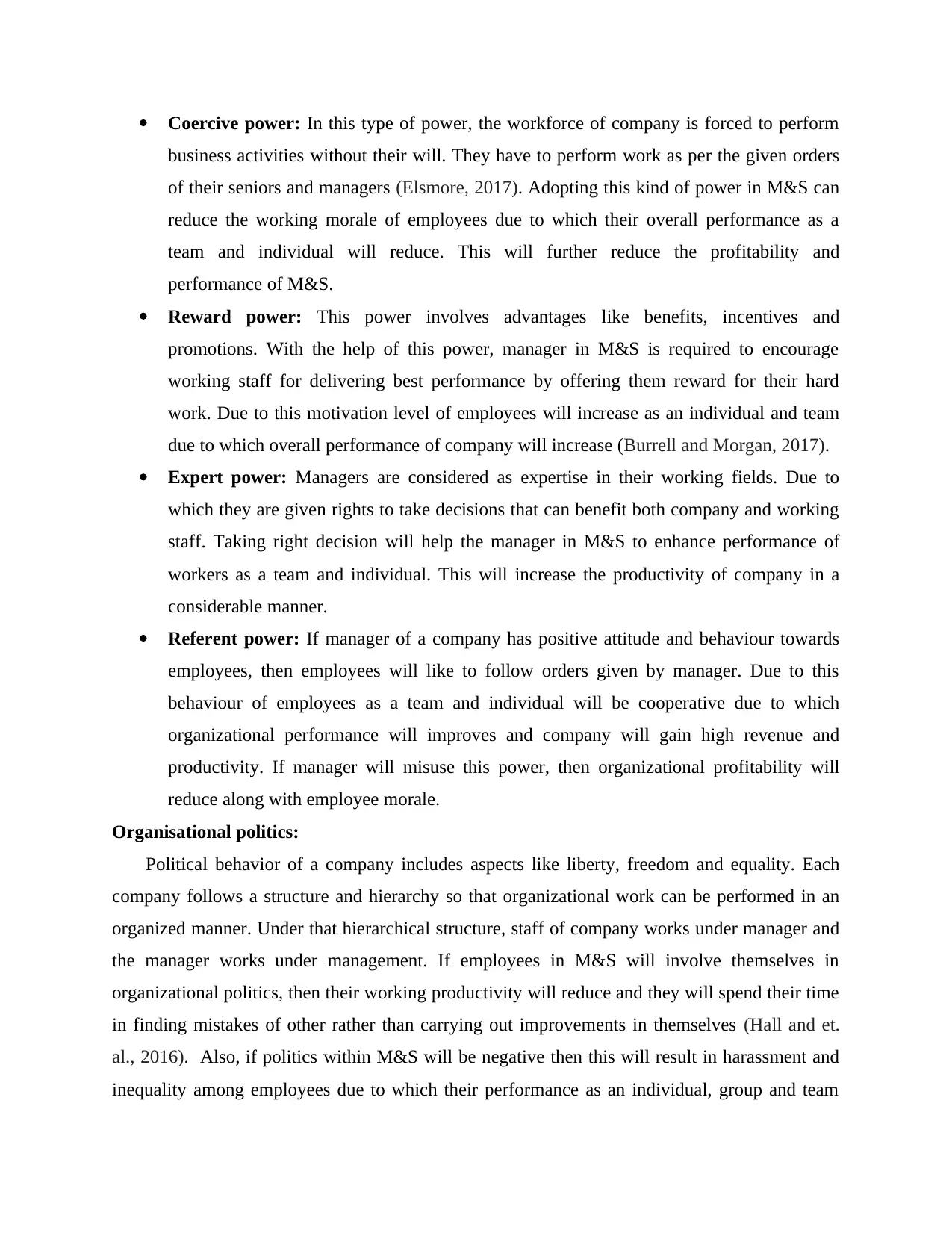
Coercive power: In this type of power, the workforce of company is forced to perform
business activities without their will. They have to perform work as per the given orders
of their seniors and managers (Elsmore, 2017). Adopting this kind of power in M&S can
reduce the working morale of employees due to which their overall performance as a
team and individual will reduce. This will further reduce the profitability and
performance of M&S.
Reward power: This power involves advantages like benefits, incentives and
promotions. With the help of this power, manager in M&S is required to encourage
working staff for delivering best performance by offering them reward for their hard
work. Due to this motivation level of employees will increase as an individual and team
due to which overall performance of company will increase (Burrell and Morgan, 2017).
Expert power: Managers are considered as expertise in their working fields. Due to
which they are given rights to take decisions that can benefit both company and working
staff. Taking right decision will help the manager in M&S to enhance performance of
workers as a team and individual. This will increase the productivity of company in a
considerable manner.
Referent power: If manager of a company has positive attitude and behaviour towards
employees, then employees will like to follow orders given by manager. Due to this
behaviour of employees as a team and individual will be cooperative due to which
organizational performance will improves and company will gain high revenue and
productivity. If manager will misuse this power, then organizational profitability will
reduce along with employee morale.
Organisational politics:
Political behavior of a company includes aspects like liberty, freedom and equality. Each
company follows a structure and hierarchy so that organizational work can be performed in an
organized manner. Under that hierarchical structure, staff of company works under manager and
the manager works under management. If employees in M&S will involve themselves in
organizational politics, then their working productivity will reduce and they will spend their time
in finding mistakes of other rather than carrying out improvements in themselves (Hall and et.
al., 2016). Also, if politics within M&S will be negative then this will result in harassment and
inequality among employees due to which their performance as an individual, group and team
business activities without their will. They have to perform work as per the given orders
of their seniors and managers (Elsmore, 2017). Adopting this kind of power in M&S can
reduce the working morale of employees due to which their overall performance as a
team and individual will reduce. This will further reduce the profitability and
performance of M&S.
Reward power: This power involves advantages like benefits, incentives and
promotions. With the help of this power, manager in M&S is required to encourage
working staff for delivering best performance by offering them reward for their hard
work. Due to this motivation level of employees will increase as an individual and team
due to which overall performance of company will increase (Burrell and Morgan, 2017).
Expert power: Managers are considered as expertise in their working fields. Due to
which they are given rights to take decisions that can benefit both company and working
staff. Taking right decision will help the manager in M&S to enhance performance of
workers as a team and individual. This will increase the productivity of company in a
considerable manner.
Referent power: If manager of a company has positive attitude and behaviour towards
employees, then employees will like to follow orders given by manager. Due to this
behaviour of employees as a team and individual will be cooperative due to which
organizational performance will improves and company will gain high revenue and
productivity. If manager will misuse this power, then organizational profitability will
reduce along with employee morale.
Organisational politics:
Political behavior of a company includes aspects like liberty, freedom and equality. Each
company follows a structure and hierarchy so that organizational work can be performed in an
organized manner. Under that hierarchical structure, staff of company works under manager and
the manager works under management. If employees in M&S will involve themselves in
organizational politics, then their working productivity will reduce and they will spend their time
in finding mistakes of other rather than carrying out improvements in themselves (Hall and et.
al., 2016). Also, if politics within M&S will be negative then this will result in harassment and
inequality among employees due to which their performance as an individual, group and team
⊘ This is a preview!⊘
Do you want full access?
Subscribe today to unlock all pages.

Trusted by 1+ million students worldwide
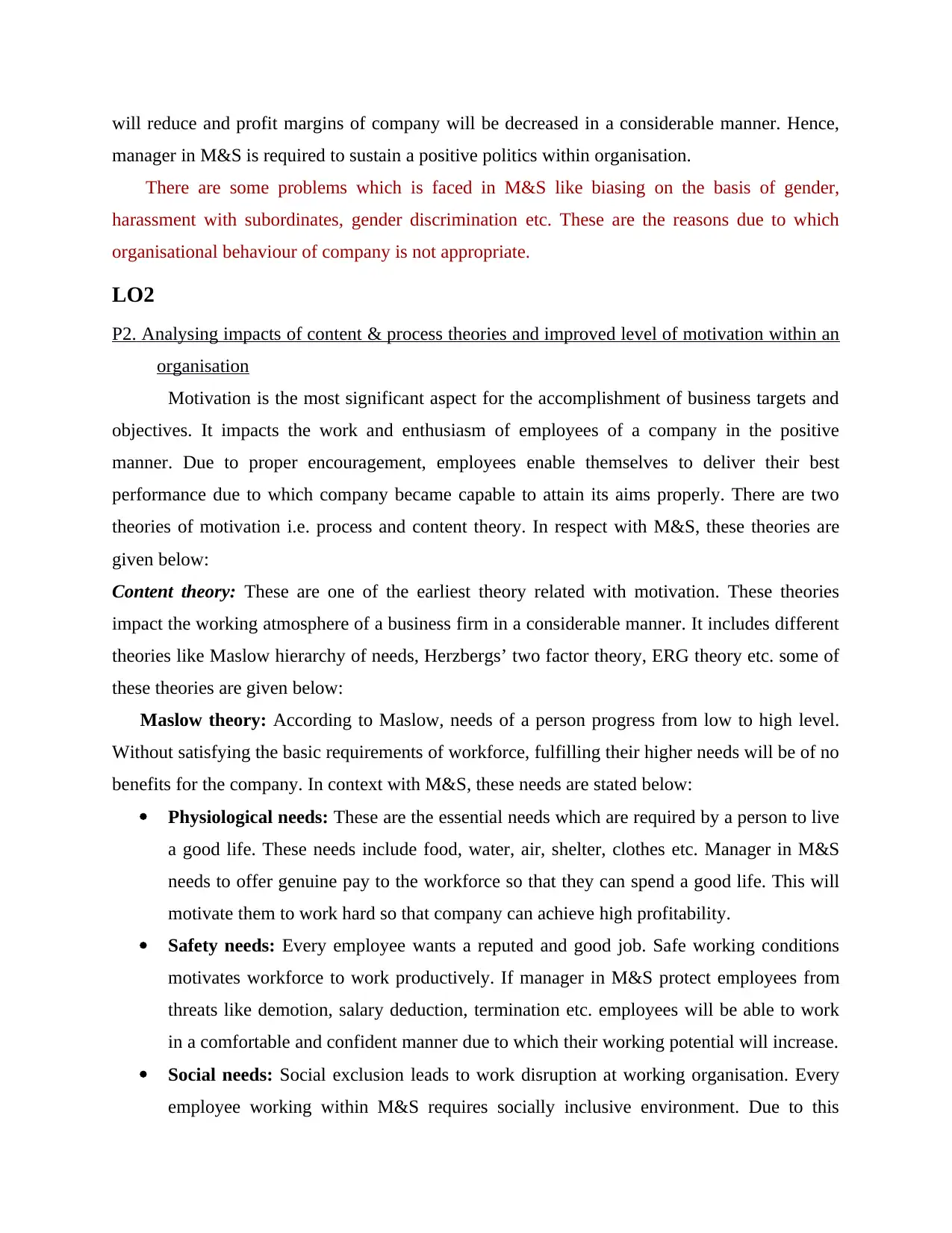
will reduce and profit margins of company will be decreased in a considerable manner. Hence,
manager in M&S is required to sustain a positive politics within organisation.
There are some problems which is faced in M&S like biasing on the basis of gender,
harassment with subordinates, gender discrimination etc. These are the reasons due to which
organisational behaviour of company is not appropriate.
LO2
P2. Analysing impacts of content & process theories and improved level of motivation within an
organisation
Motivation is the most significant aspect for the accomplishment of business targets and
objectives. It impacts the work and enthusiasm of employees of a company in the positive
manner. Due to proper encouragement, employees enable themselves to deliver their best
performance due to which company became capable to attain its aims properly. There are two
theories of motivation i.e. process and content theory. In respect with M&S, these theories are
given below:
Content theory: These are one of the earliest theory related with motivation. These theories
impact the working atmosphere of a business firm in a considerable manner. It includes different
theories like Maslow hierarchy of needs, Herzbergs’ two factor theory, ERG theory etc. some of
these theories are given below:
Maslow theory: According to Maslow, needs of a person progress from low to high level.
Without satisfying the basic requirements of workforce, fulfilling their higher needs will be of no
benefits for the company. In context with M&S, these needs are stated below:
Physiological needs: These are the essential needs which are required by a person to live
a good life. These needs include food, water, air, shelter, clothes etc. Manager in M&S
needs to offer genuine pay to the workforce so that they can spend a good life. This will
motivate them to work hard so that company can achieve high profitability.
Safety needs: Every employee wants a reputed and good job. Safe working conditions
motivates workforce to work productively. If manager in M&S protect employees from
threats like demotion, salary deduction, termination etc. employees will be able to work
in a comfortable and confident manner due to which their working potential will increase.
Social needs: Social exclusion leads to work disruption at working organisation. Every
employee working within M&S requires socially inclusive environment. Due to this
manager in M&S is required to sustain a positive politics within organisation.
There are some problems which is faced in M&S like biasing on the basis of gender,
harassment with subordinates, gender discrimination etc. These are the reasons due to which
organisational behaviour of company is not appropriate.
LO2
P2. Analysing impacts of content & process theories and improved level of motivation within an
organisation
Motivation is the most significant aspect for the accomplishment of business targets and
objectives. It impacts the work and enthusiasm of employees of a company in the positive
manner. Due to proper encouragement, employees enable themselves to deliver their best
performance due to which company became capable to attain its aims properly. There are two
theories of motivation i.e. process and content theory. In respect with M&S, these theories are
given below:
Content theory: These are one of the earliest theory related with motivation. These theories
impact the working atmosphere of a business firm in a considerable manner. It includes different
theories like Maslow hierarchy of needs, Herzbergs’ two factor theory, ERG theory etc. some of
these theories are given below:
Maslow theory: According to Maslow, needs of a person progress from low to high level.
Without satisfying the basic requirements of workforce, fulfilling their higher needs will be of no
benefits for the company. In context with M&S, these needs are stated below:
Physiological needs: These are the essential needs which are required by a person to live
a good life. These needs include food, water, air, shelter, clothes etc. Manager in M&S
needs to offer genuine pay to the workforce so that they can spend a good life. This will
motivate them to work hard so that company can achieve high profitability.
Safety needs: Every employee wants a reputed and good job. Safe working conditions
motivates workforce to work productively. If manager in M&S protect employees from
threats like demotion, salary deduction, termination etc. employees will be able to work
in a comfortable and confident manner due to which their working potential will increase.
Social needs: Social exclusion leads to work disruption at working organisation. Every
employee working within M&S requires socially inclusive environment. Due to this
Paraphrase This Document
Need a fresh take? Get an instant paraphrase of this document with our AI Paraphraser
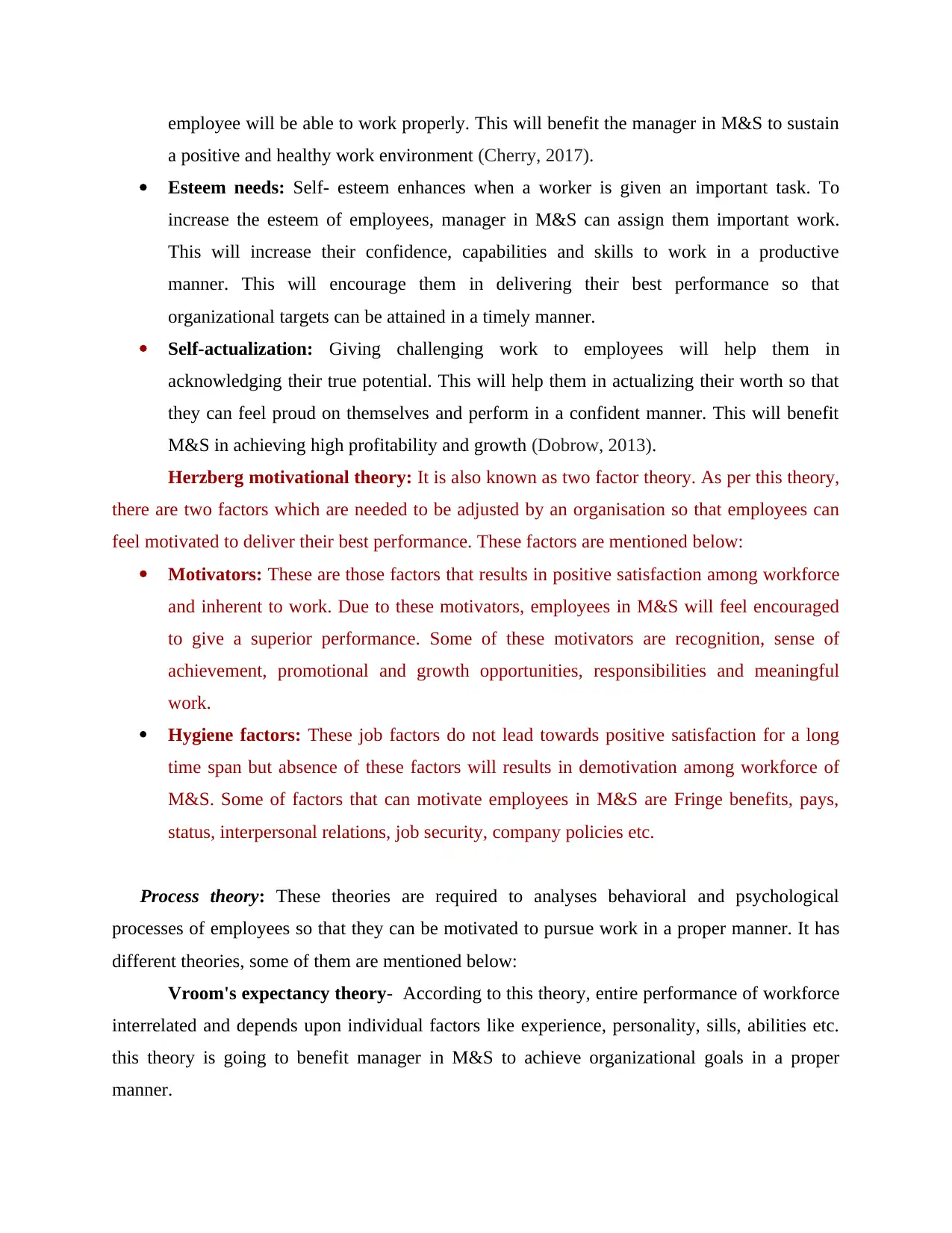
employee will be able to work properly. This will benefit the manager in M&S to sustain
a positive and healthy work environment (Cherry, 2017).
Esteem needs: Self- esteem enhances when a worker is given an important task. To
increase the esteem of employees, manager in M&S can assign them important work.
This will increase their confidence, capabilities and skills to work in a productive
manner. This will encourage them in delivering their best performance so that
organizational targets can be attained in a timely manner.
Self-actualization: Giving challenging work to employees will help them in
acknowledging their true potential. This will help them in actualizing their worth so that
they can feel proud on themselves and perform in a confident manner. This will benefit
M&S in achieving high profitability and growth (Dobrow, 2013).
Herzberg motivational theory: It is also known as two factor theory. As per this theory,
there are two factors which are needed to be adjusted by an organisation so that employees can
feel motivated to deliver their best performance. These factors are mentioned below:
Motivators: These are those factors that results in positive satisfaction among workforce
and inherent to work. Due to these motivators, employees in M&S will feel encouraged
to give a superior performance. Some of these motivators are recognition, sense of
achievement, promotional and growth opportunities, responsibilities and meaningful
work.
Hygiene factors: These job factors do not lead towards positive satisfaction for a long
time span but absence of these factors will results in demotivation among workforce of
M&S. Some of factors that can motivate employees in M&S are Fringe benefits, pays,
status, interpersonal relations, job security, company policies etc.
Process theory: These theories are required to analyses behavioral and psychological
processes of employees so that they can be motivated to pursue work in a proper manner. It has
different theories, some of them are mentioned below:
Vroom's expectancy theory- According to this theory, entire performance of workforce
interrelated and depends upon individual factors like experience, personality, sills, abilities etc.
this theory is going to benefit manager in M&S to achieve organizational goals in a proper
manner.
a positive and healthy work environment (Cherry, 2017).
Esteem needs: Self- esteem enhances when a worker is given an important task. To
increase the esteem of employees, manager in M&S can assign them important work.
This will increase their confidence, capabilities and skills to work in a productive
manner. This will encourage them in delivering their best performance so that
organizational targets can be attained in a timely manner.
Self-actualization: Giving challenging work to employees will help them in
acknowledging their true potential. This will help them in actualizing their worth so that
they can feel proud on themselves and perform in a confident manner. This will benefit
M&S in achieving high profitability and growth (Dobrow, 2013).
Herzberg motivational theory: It is also known as two factor theory. As per this theory,
there are two factors which are needed to be adjusted by an organisation so that employees can
feel motivated to deliver their best performance. These factors are mentioned below:
Motivators: These are those factors that results in positive satisfaction among workforce
and inherent to work. Due to these motivators, employees in M&S will feel encouraged
to give a superior performance. Some of these motivators are recognition, sense of
achievement, promotional and growth opportunities, responsibilities and meaningful
work.
Hygiene factors: These job factors do not lead towards positive satisfaction for a long
time span but absence of these factors will results in demotivation among workforce of
M&S. Some of factors that can motivate employees in M&S are Fringe benefits, pays,
status, interpersonal relations, job security, company policies etc.
Process theory: These theories are required to analyses behavioral and psychological
processes of employees so that they can be motivated to pursue work in a proper manner. It has
different theories, some of them are mentioned below:
Vroom's expectancy theory- According to this theory, entire performance of workforce
interrelated and depends upon individual factors like experience, personality, sills, abilities etc.
this theory is going to benefit manager in M&S to achieve organizational goals in a proper
manner.
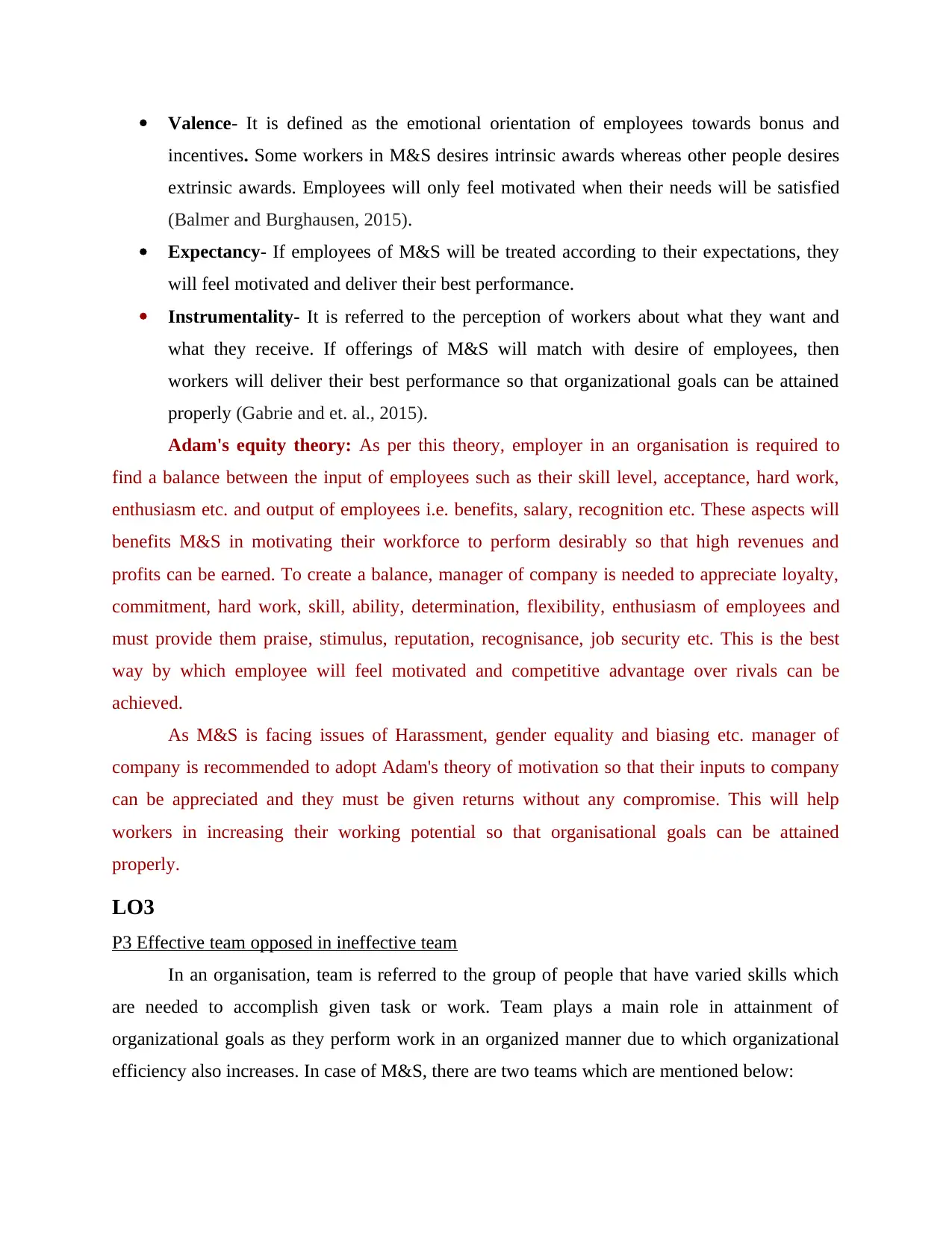
Valence- It is defined as the emotional orientation of employees towards bonus and
incentives. Some workers in M&S desires intrinsic awards whereas other people desires
extrinsic awards. Employees will only feel motivated when their needs will be satisfied
(Balmer and Burghausen, 2015).
Expectancy- If employees of M&S will be treated according to their expectations, they
will feel motivated and deliver their best performance.
Instrumentality- It is referred to the perception of workers about what they want and
what they receive. If offerings of M&S will match with desire of employees, then
workers will deliver their best performance so that organizational goals can be attained
properly (Gabrie and et. al., 2015).
Adam's equity theory: As per this theory, employer in an organisation is required to
find a balance between the input of employees such as their skill level, acceptance, hard work,
enthusiasm etc. and output of employees i.e. benefits, salary, recognition etc. These aspects will
benefits M&S in motivating their workforce to perform desirably so that high revenues and
profits can be earned. To create a balance, manager of company is needed to appreciate loyalty,
commitment, hard work, skill, ability, determination, flexibility, enthusiasm of employees and
must provide them praise, stimulus, reputation, recognisance, job security etc. This is the best
way by which employee will feel motivated and competitive advantage over rivals can be
achieved.
As M&S is facing issues of Harassment, gender equality and biasing etc. manager of
company is recommended to adopt Adam's theory of motivation so that their inputs to company
can be appreciated and they must be given returns without any compromise. This will help
workers in increasing their working potential so that organisational goals can be attained
properly.
LO3
P3 Effective team opposed in ineffective team
In an organisation, team is referred to the group of people that have varied skills which
are needed to accomplish given task or work. Team plays a main role in attainment of
organizational goals as they perform work in an organized manner due to which organizational
efficiency also increases. In case of M&S, there are two teams which are mentioned below:
incentives. Some workers in M&S desires intrinsic awards whereas other people desires
extrinsic awards. Employees will only feel motivated when their needs will be satisfied
(Balmer and Burghausen, 2015).
Expectancy- If employees of M&S will be treated according to their expectations, they
will feel motivated and deliver their best performance.
Instrumentality- It is referred to the perception of workers about what they want and
what they receive. If offerings of M&S will match with desire of employees, then
workers will deliver their best performance so that organizational goals can be attained
properly (Gabrie and et. al., 2015).
Adam's equity theory: As per this theory, employer in an organisation is required to
find a balance between the input of employees such as their skill level, acceptance, hard work,
enthusiasm etc. and output of employees i.e. benefits, salary, recognition etc. These aspects will
benefits M&S in motivating their workforce to perform desirably so that high revenues and
profits can be earned. To create a balance, manager of company is needed to appreciate loyalty,
commitment, hard work, skill, ability, determination, flexibility, enthusiasm of employees and
must provide them praise, stimulus, reputation, recognisance, job security etc. This is the best
way by which employee will feel motivated and competitive advantage over rivals can be
achieved.
As M&S is facing issues of Harassment, gender equality and biasing etc. manager of
company is recommended to adopt Adam's theory of motivation so that their inputs to company
can be appreciated and they must be given returns without any compromise. This will help
workers in increasing their working potential so that organisational goals can be attained
properly.
LO3
P3 Effective team opposed in ineffective team
In an organisation, team is referred to the group of people that have varied skills which
are needed to accomplish given task or work. Team plays a main role in attainment of
organizational goals as they perform work in an organized manner due to which organizational
efficiency also increases. In case of M&S, there are two teams which are mentioned below:
⊘ This is a preview!⊘
Do you want full access?
Subscribe today to unlock all pages.

Trusted by 1+ million students worldwide
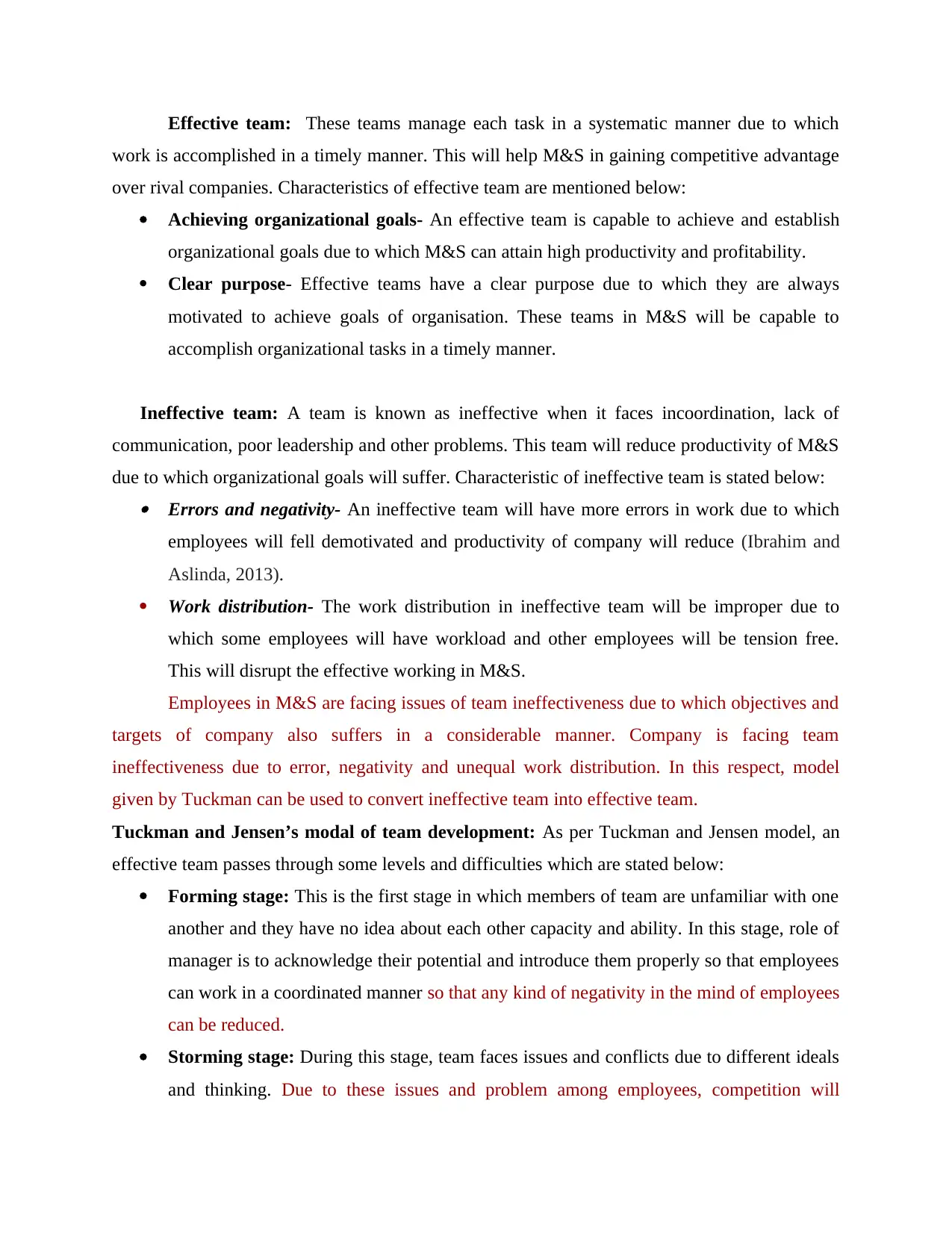
Effective team: These teams manage each task in a systematic manner due to which
work is accomplished in a timely manner. This will help M&S in gaining competitive advantage
over rival companies. Characteristics of effective team are mentioned below:
Achieving organizational goals- An effective team is capable to achieve and establish
organizational goals due to which M&S can attain high productivity and profitability.
Clear purpose- Effective teams have a clear purpose due to which they are always
motivated to achieve goals of organisation. These teams in M&S will be capable to
accomplish organizational tasks in a timely manner.
Ineffective team: A team is known as ineffective when it faces incoordination, lack of
communication, poor leadership and other problems. This team will reduce productivity of M&S
due to which organizational goals will suffer. Characteristic of ineffective team is stated below: Errors and negativity- An ineffective team will have more errors in work due to which
employees will fell demotivated and productivity of company will reduce (Ibrahim and
Aslinda, 2013).
Work distribution- The work distribution in ineffective team will be improper due to
which some employees will have workload and other employees will be tension free.
This will disrupt the effective working in M&S.
Employees in M&S are facing issues of team ineffectiveness due to which objectives and
targets of company also suffers in a considerable manner. Company is facing team
ineffectiveness due to error, negativity and unequal work distribution. In this respect, model
given by Tuckman can be used to convert ineffective team into effective team.
Tuckman and Jensen’s modal of team development: As per Tuckman and Jensen model, an
effective team passes through some levels and difficulties which are stated below:
Forming stage: This is the first stage in which members of team are unfamiliar with one
another and they have no idea about each other capacity and ability. In this stage, role of
manager is to acknowledge their potential and introduce them properly so that employees
can work in a coordinated manner so that any kind of negativity in the mind of employees
can be reduced.
Storming stage: During this stage, team faces issues and conflicts due to different ideals
and thinking. Due to these issues and problem among employees, competition will
work is accomplished in a timely manner. This will help M&S in gaining competitive advantage
over rival companies. Characteristics of effective team are mentioned below:
Achieving organizational goals- An effective team is capable to achieve and establish
organizational goals due to which M&S can attain high productivity and profitability.
Clear purpose- Effective teams have a clear purpose due to which they are always
motivated to achieve goals of organisation. These teams in M&S will be capable to
accomplish organizational tasks in a timely manner.
Ineffective team: A team is known as ineffective when it faces incoordination, lack of
communication, poor leadership and other problems. This team will reduce productivity of M&S
due to which organizational goals will suffer. Characteristic of ineffective team is stated below: Errors and negativity- An ineffective team will have more errors in work due to which
employees will fell demotivated and productivity of company will reduce (Ibrahim and
Aslinda, 2013).
Work distribution- The work distribution in ineffective team will be improper due to
which some employees will have workload and other employees will be tension free.
This will disrupt the effective working in M&S.
Employees in M&S are facing issues of team ineffectiveness due to which objectives and
targets of company also suffers in a considerable manner. Company is facing team
ineffectiveness due to error, negativity and unequal work distribution. In this respect, model
given by Tuckman can be used to convert ineffective team into effective team.
Tuckman and Jensen’s modal of team development: As per Tuckman and Jensen model, an
effective team passes through some levels and difficulties which are stated below:
Forming stage: This is the first stage in which members of team are unfamiliar with one
another and they have no idea about each other capacity and ability. In this stage, role of
manager is to acknowledge their potential and introduce them properly so that employees
can work in a coordinated manner so that any kind of negativity in the mind of employees
can be reduced.
Storming stage: During this stage, team faces issues and conflicts due to different ideals
and thinking. Due to these issues and problem among employees, competition will
Paraphrase This Document
Need a fresh take? Get an instant paraphrase of this document with our AI Paraphraser
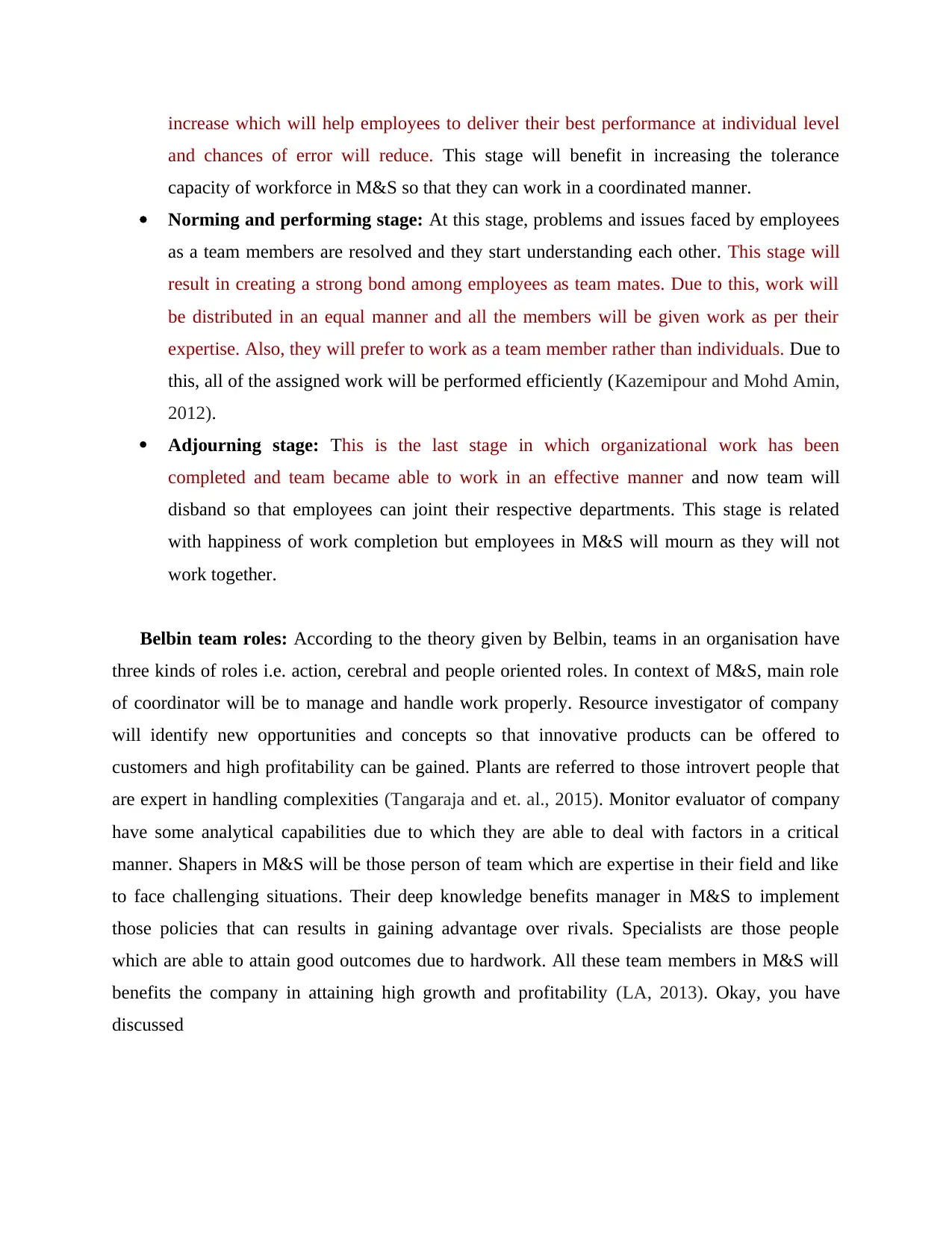
increase which will help employees to deliver their best performance at individual level
and chances of error will reduce. This stage will benefit in increasing the tolerance
capacity of workforce in M&S so that they can work in a coordinated manner.
Norming and performing stage: At this stage, problems and issues faced by employees
as a team members are resolved and they start understanding each other. This stage will
result in creating a strong bond among employees as team mates. Due to this, work will
be distributed in an equal manner and all the members will be given work as per their
expertise. Also, they will prefer to work as a team member rather than individuals. Due to
this, all of the assigned work will be performed efficiently (Kazemipour and Mohd Amin,
2012).
Adjourning stage: This is the last stage in which organizational work has been
completed and team became able to work in an effective manner and now team will
disband so that employees can joint their respective departments. This stage is related
with happiness of work completion but employees in M&S will mourn as they will not
work together.
Belbin team roles: According to the theory given by Belbin, teams in an organisation have
three kinds of roles i.e. action, cerebral and people oriented roles. In context of M&S, main role
of coordinator will be to manage and handle work properly. Resource investigator of company
will identify new opportunities and concepts so that innovative products can be offered to
customers and high profitability can be gained. Plants are referred to those introvert people that
are expert in handling complexities (Tangaraja and et. al., 2015). Monitor evaluator of company
have some analytical capabilities due to which they are able to deal with factors in a critical
manner. Shapers in M&S will be those person of team which are expertise in their field and like
to face challenging situations. Their deep knowledge benefits manager in M&S to implement
those policies that can results in gaining advantage over rivals. Specialists are those people
which are able to attain good outcomes due to hardwork. All these team members in M&S will
benefits the company in attaining high growth and profitability (LA, 2013). Okay, you have
discussed
and chances of error will reduce. This stage will benefit in increasing the tolerance
capacity of workforce in M&S so that they can work in a coordinated manner.
Norming and performing stage: At this stage, problems and issues faced by employees
as a team members are resolved and they start understanding each other. This stage will
result in creating a strong bond among employees as team mates. Due to this, work will
be distributed in an equal manner and all the members will be given work as per their
expertise. Also, they will prefer to work as a team member rather than individuals. Due to
this, all of the assigned work will be performed efficiently (Kazemipour and Mohd Amin,
2012).
Adjourning stage: This is the last stage in which organizational work has been
completed and team became able to work in an effective manner and now team will
disband so that employees can joint their respective departments. This stage is related
with happiness of work completion but employees in M&S will mourn as they will not
work together.
Belbin team roles: According to the theory given by Belbin, teams in an organisation have
three kinds of roles i.e. action, cerebral and people oriented roles. In context of M&S, main role
of coordinator will be to manage and handle work properly. Resource investigator of company
will identify new opportunities and concepts so that innovative products can be offered to
customers and high profitability can be gained. Plants are referred to those introvert people that
are expert in handling complexities (Tangaraja and et. al., 2015). Monitor evaluator of company
have some analytical capabilities due to which they are able to deal with factors in a critical
manner. Shapers in M&S will be those person of team which are expertise in their field and like
to face challenging situations. Their deep knowledge benefits manager in M&S to implement
those policies that can results in gaining advantage over rivals. Specialists are those people
which are able to attain good outcomes due to hardwork. All these team members in M&S will
benefits the company in attaining high growth and profitability (LA, 2013). Okay, you have
discussed
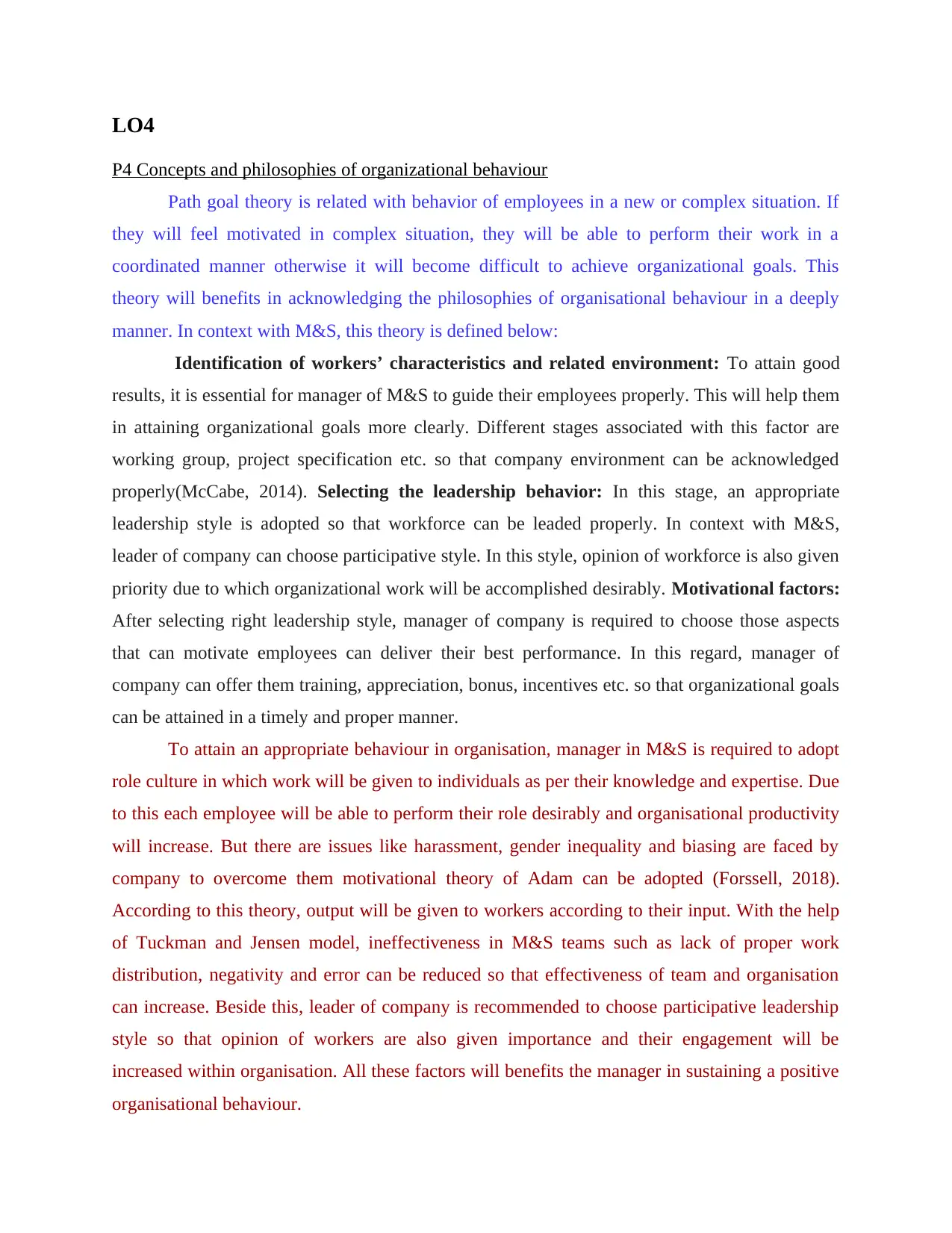
LO4
P4 Concepts and philosophies of organizational behaviour
Path goal theory is related with behavior of employees in a new or complex situation. If
they will feel motivated in complex situation, they will be able to perform their work in a
coordinated manner otherwise it will become difficult to achieve organizational goals. This
theory will benefits in acknowledging the philosophies of organisational behaviour in a deeply
manner. In context with M&S, this theory is defined below:
Identification of workers’ characteristics and related environment: To attain good
results, it is essential for manager of M&S to guide their employees properly. This will help them
in attaining organizational goals more clearly. Different stages associated with this factor are
working group, project specification etc. so that company environment can be acknowledged
properly(McCabe, 2014). Selecting the leadership behavior: In this stage, an appropriate
leadership style is adopted so that workforce can be leaded properly. In context with M&S,
leader of company can choose participative style. In this style, opinion of workforce is also given
priority due to which organizational work will be accomplished desirably. Motivational factors:
After selecting right leadership style, manager of company is required to choose those aspects
that can motivate employees can deliver their best performance. In this regard, manager of
company can offer them training, appreciation, bonus, incentives etc. so that organizational goals
can be attained in a timely and proper manner.
To attain an appropriate behaviour in organisation, manager in M&S is required to adopt
role culture in which work will be given to individuals as per their knowledge and expertise. Due
to this each employee will be able to perform their role desirably and organisational productivity
will increase. But there are issues like harassment, gender inequality and biasing are faced by
company to overcome them motivational theory of Adam can be adopted (Forssell, 2018).
According to this theory, output will be given to workers according to their input. With the help
of Tuckman and Jensen model, ineffectiveness in M&S teams such as lack of proper work
distribution, negativity and error can be reduced so that effectiveness of team and organisation
can increase. Beside this, leader of company is recommended to choose participative leadership
style so that opinion of workers are also given importance and their engagement will be
increased within organisation. All these factors will benefits the manager in sustaining a positive
organisational behaviour.
P4 Concepts and philosophies of organizational behaviour
Path goal theory is related with behavior of employees in a new or complex situation. If
they will feel motivated in complex situation, they will be able to perform their work in a
coordinated manner otherwise it will become difficult to achieve organizational goals. This
theory will benefits in acknowledging the philosophies of organisational behaviour in a deeply
manner. In context with M&S, this theory is defined below:
Identification of workers’ characteristics and related environment: To attain good
results, it is essential for manager of M&S to guide their employees properly. This will help them
in attaining organizational goals more clearly. Different stages associated with this factor are
working group, project specification etc. so that company environment can be acknowledged
properly(McCabe, 2014). Selecting the leadership behavior: In this stage, an appropriate
leadership style is adopted so that workforce can be leaded properly. In context with M&S,
leader of company can choose participative style. In this style, opinion of workforce is also given
priority due to which organizational work will be accomplished desirably. Motivational factors:
After selecting right leadership style, manager of company is required to choose those aspects
that can motivate employees can deliver their best performance. In this regard, manager of
company can offer them training, appreciation, bonus, incentives etc. so that organizational goals
can be attained in a timely and proper manner.
To attain an appropriate behaviour in organisation, manager in M&S is required to adopt
role culture in which work will be given to individuals as per their knowledge and expertise. Due
to this each employee will be able to perform their role desirably and organisational productivity
will increase. But there are issues like harassment, gender inequality and biasing are faced by
company to overcome them motivational theory of Adam can be adopted (Forssell, 2018).
According to this theory, output will be given to workers according to their input. With the help
of Tuckman and Jensen model, ineffectiveness in M&S teams such as lack of proper work
distribution, negativity and error can be reduced so that effectiveness of team and organisation
can increase. Beside this, leader of company is recommended to choose participative leadership
style so that opinion of workers are also given importance and their engagement will be
increased within organisation. All these factors will benefits the manager in sustaining a positive
organisational behaviour.
⊘ This is a preview!⊘
Do you want full access?
Subscribe today to unlock all pages.

Trusted by 1+ million students worldwide
1 out of 15
Related Documents
Your All-in-One AI-Powered Toolkit for Academic Success.
+13062052269
info@desklib.com
Available 24*7 on WhatsApp / Email
![[object Object]](/_next/static/media/star-bottom.7253800d.svg)
Unlock your academic potential
Copyright © 2020–2026 A2Z Services. All Rights Reserved. Developed and managed by ZUCOL.





